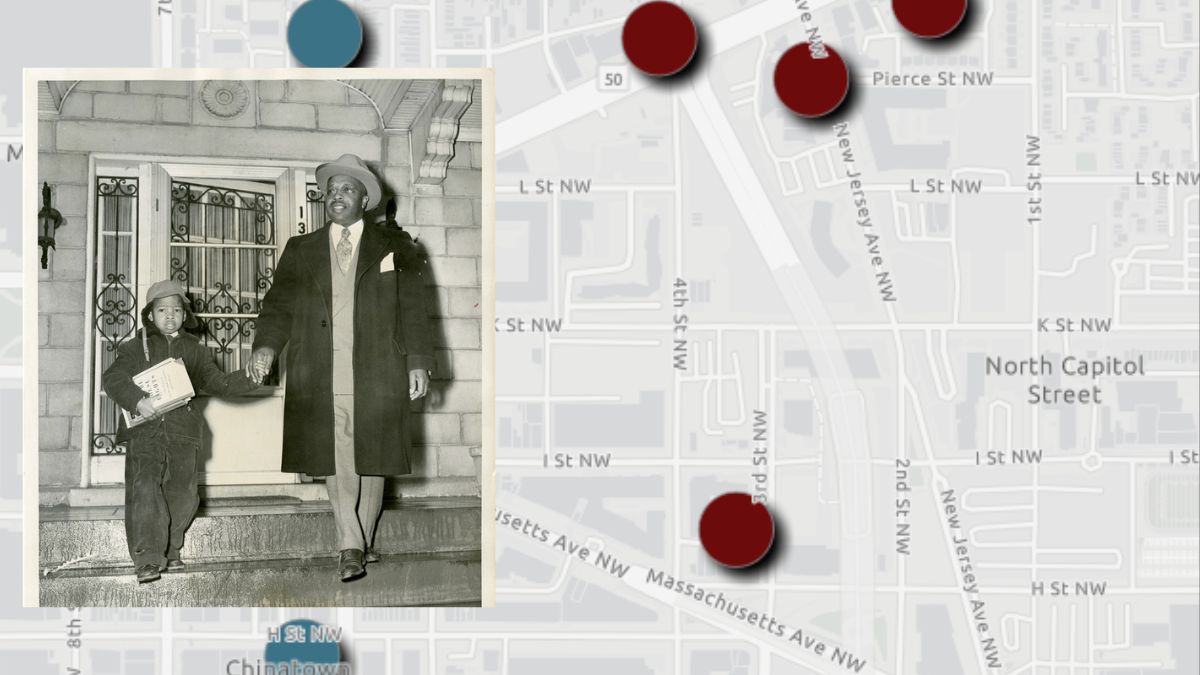MVT Black History Month Celebration Continues with Spotlight on Bishop Smallwood E. Williams, Force Behind the “Bible Way Bend”
Thursday February 15, 2024
As part of our continuing celebration of Black History Month, this week we pay tribute to civil rights activist Bishop Smallwood E. Williams (1907-1991).
After arriving in DC from Columbus, Ohio with a little more than $5 in his pocket, Bishop Williams in 1927 founded Bible Way Church, one of two Mount Vernon Triangle sites featured on DC Office of Planning’s (OP) interactive map of 300 Black history sites across Washington, DC.
A former president of the DC chapter of the Southern Christian Leadership Conference and a delegate to several national conventions of the Democratic Party, Bishop Williams played an integral role in the desegregation efforts of Washington, DC and was a champion of DC’s Black community until his death in 1991. Notably, he prevented the federal government’s acquisition of his church property in the early 1960s to build a highway exit ramp for I-395 onto New York Avenue, resulting in what’s today an alley that runs behind Bible Way Church known as the “Bible Way Bend.”
It was with Bishop Williams’ belief in supporting not only the spiritual needs but also the physical needs of his community that has led to Bible Way Church sponsoring more than 700 units of affordable housing in the vicinity of New Jersey Avenue NW & K Street NW. These include Golden Rule Apartments, Golden Rule Plaza, SeVerna Apartments, SeVerna on K Apartments, Plaza West Apartments & Plaza West Grandfamily Apartments. Helping to continue in the fulfillment of this vision was his daughter Yvonne Williams, a long-time former Mount Vernon Triangle CID Board Member who earned the organization’s Lifetime Achievement Award in 2019 (photo) for her work to continue what Bishop Williams put in place decades ago and carry forward her father’s vision to build affordable housing units in the District.
Bishop Williams used to say that church members had a vital interest in “an amicable relationship with the law and a respect for the rights of others” and that this is what brought the church into the political sphere. His career as a preacher had humble beginnings but blossomed into over half a century of impactful spiritual work. Starting at a fire hydrant that served as a makeshift pulpit at the corner of 7th & O Streets NW, in 1927, he organized Bible Way Church now located at 1100 New Jersey Avenue NW. At the time of his death in 1991, Bible Way Church World Wide had expanded to an impressive 350 churches with over 100,000 members and a radio ministry.
Bishop Williams was able to use his platform as a respected minister to affect social change. In 1948 Williams, then acting in his role as chairman of the National Prayer Service for Brotherhood, urged President Harry S. Truman to abolish segregation in Washington, DC. Throughout the 1950s, he campaigned to desegregate DC schools and went as far as to stage a sit-in of the Whites-only Wheatley Elementary School with his five-year-old son Wallace. By the 1960s Bishop Williams was a strong voice that urged the passage of the Civil Rights Act of 1963. He also saw the importance of lifting other Black voices and boosted the campaigns of Jesse L. Jackson for Shadow Senator of DC and Delegate Eleanor Holmes Norton’s first run for US House of Representatives in 1990.
The legacy left behind by Bishop Williams is one of perseverance, respect, and support. We are honored to have his story woven into the historical fabric of Mount Vernon Triangle.
Related Links:
“Civil Rights Tour: Protest – Bishop Smallwood Williams, Civil Rights Agitator,” DC Historic Sites
“Farewell to a Clergyman who Shaped Church, City,” The Washington Post, July 6, 1991
“Bible Way Church Continues Community Legacy Along New York Avenue,” April 12, 2013
“MVT Celebrates Black History Month,” February 2, 2024
“MVT Black History Month Celebration Continues with Spotlight on AAMC’s Health Equity Initiatives,” February 9, 2024[/vc_column_text][/vc_column][/vc_row]






